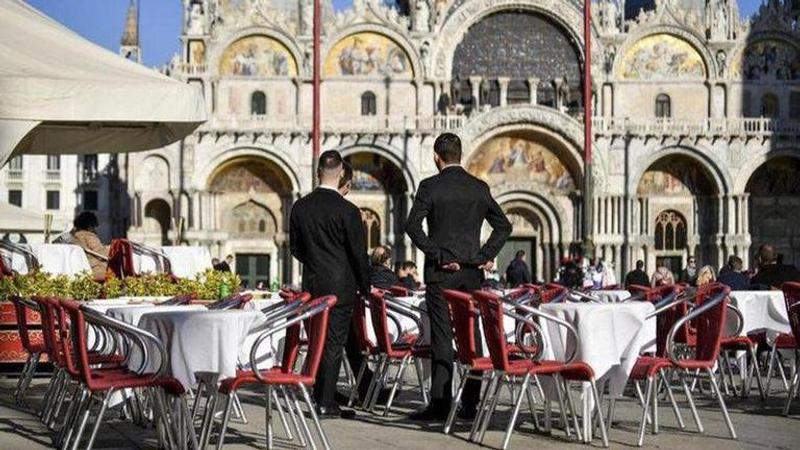Published 19:17 IST, March 9th 2020
Markets plunge, northern Italy locked down as virus spreads
Hundreds of billions of dollars were wiped from financial markets on Monday and millions of people in northern Italy were put under lockdown as the deadly coronavirus disrupted economies and societies across the world.

Hundreds of billions of dollars were wiped from financial markets on Monday and millions of people in northern Italy were put under lockdown as the deadly coronavirus disrupted economies and societies across the world.
Confirmation from Iran of a further 595 cases on Monday pushed the global number of infections past 110,000 with more than 3,800 deaths, according to a tally by AFP based on official sources.
In Europe's hardest-hit country, Italy, officials are trying to close off a vast area including the cities of Milan and Venice -- mimicking a lockdown at the disease's epicentre in China.
Tens of millions of people are now in quarantine worldwide but there are fears that the disease will spread further and force several economies into recession.
European stock markets slumped dramatically with London's FTSE index down more than 6.5 percent in early afternoon deals and the DAX in Frankfurt nearly seven percent lower, following earlier steep losses in Asia.
Equity markets fell more than five percent in Tokyo and seven percent in Sydney, wiping hundreds of billions of dollars from the value of companies and compounding weeks of losses.
Millions of people have seen daily life disrupted by school closures, runs on basic household goods and travel restrictions, with Italy the latest country to announce severe measures.
Police are setting up controls at train stations and stopping all cars on main roads across the north -- and flights from Milan are being suspended.
But Italian officials face a further headache after prisoners fearful of infection protested or rioted in 23 jails across the country -- leaving several dead.
And the effects of the Italian outbreak were still rippling out to other European countries -- the UK's Daily Telegraph reporting that air passengers arriving from virus hotspots such as Milan were still not being checked for COVID-19.
Sporting events continue to be severely disrupted, with tennis the latest sport to be hit -- the Indian Wells tournament in Caliform, one of the world's biggest, being cancelled.
Top-flight football matches across Europe were being played behind closed doors, and international rugby matches have also fallen prey to the virus with several postponements.
There are mounting concerns that the United States -- the world's largest and most connected economy -- could be the next COVID-19 hotspot.
At least 21 people have died in the country and the number of cases soared past 500 on Sunday as President Donald Trump's administration struggled to deal with a virus-hit cruise ship stuck off the California coast.
The Grand Princess is due to dock in Oakland on Monday with 21 confirmed infections among its 3,500 passengers -- Trump has argued they should stay on the ship but no plan has yet been announced.
The president has been accused of peddling misinformation on the outbreak, but he hit back on Sunday and accused the media of trying to make his government "look bad", tweeting that the White House had a "perfectly coordinated and fine tuned plan".
Market researchers at ANZ Bank said Trump's uncertain response was fuelling global financial jitters.
"Market fear hasn't been helped by concerns that the US has been slow to respond to the crisis," they told clients, highlighting what it said was a lack of transparency and poor communication.
Some forecasters are painting a doom-laden picture for the global economy -- the UN Conference on Trade, Investment and Development suggesting the virus spread could hit foreign direct investment worldwide by as much as 15 per cent.
Several central banks have already intervened to prop up faltering economies and there are growing calls for governments to step in with substantial fiscal stimulus.
And the International Energy Agency reported Monday that the world was set for its first annual decline in oil consumption in more than a decade because of the outbreak.
But there were signs that the peak may have been reached in both China and South Korea.
China said it had closed most of the makeshift hospitals opened to receive coronavirus patients in the epidemic's epicentre around Wuhan, as the number of new infections in the country hit a record low.
There were 40 new cases nationwide, the National Health Commission said, the lowest number of fresh cases since it started reporting the data in January. China has seen almost 75 per cent of the global coronavirus cases.
South Korea, which has one of the largest coronavirus totals outside China, reported its smallest daily rise in cases for two weeks.
A total of 248 cases were confirmed on Sunday, the Korea Centres for Disease Control and Prevention (KCDC) said. The increase took its total to 7,382.
But Iran on Monday announced 43 new deaths, bringing its toll to 237.
India, meanwhile, announced a ban on foreign cruise ships entering its ports and launched a 30-second coronavirus awareness message to be sent to via mobile phone.
It begins with the sound of coughing.
Updated 19:17 IST, March 9th 2020




